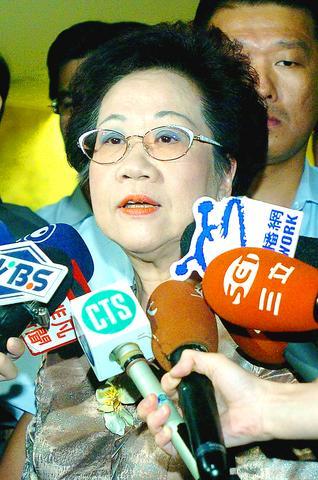Pop star Chang Hui-mei (
The Taiwanese pop diva, better known as A-mei, again found herself at the center of political controversy yesterday. But unlike last time, when China enforced a media blackout and she received threats from Chinese ultra-nationalists, A-mei is now under fire from those who champion Taiwanese pride.

PHOTO: LIAO CHENG-HUEI, TAIPEI TIMES
The Puyuma Aboriginal singer said she was shocked that some TV talk show hosts urged a boycott of her upon her return from her concert in Beijing last Saturday. Wang Ben-hu (
A-mei was quoted in by CCTV as saying "I had to suffer the consequences of a decision that was not made by me ... I should have been more discreet in my behavior, which impacts so many people."
Vice President Annette Lu (
"How could anyone not have any political consciousness?" Lu said. "If A-mei's being oppressed by China resulted from her performance of the national anthem, A-mei should say out loud [to China]: `It is my right to sing the Republic of China's national anthem. You Chinese people can sing your national anthem, why can't I sing mine?'"
Lu added, "I can understand why A-mei didn't say it, because she is still young. But if the two governments were at war, would it be more important for A-mei to sing in Beijing or to defend the 23 million people [of Taiwan]?"
The vice president and others' comments prompted the 31-year-old singer to make a brief response yesterday afternoon at a press conference.
"I am just a singer," the diva said. "I am not capable of dealing with politics. Many things are out of my control ... The world of grown-ups should be left to grown-ups. We all know that singers should not be involved in politics."
The singer made it clear that she has no intention of engaging in anything irrelevant to her profession. A-mei also called on the media to cease its sensational reporting and stop distorting her words. "What we really need is more peace and love in our society," said the singer.
As for her questioned patriotism, A-mei said she will be a representative for the Tourism Bureau and that her goal is to introduce the country's beauty and the goodwill of its people to a wider international audience.
Meanwhile, Premier Yu Shyi-kun yesterday offered a clarification of his own previous remarks about the singer. Local media had reported Yu as making critical remarks about A-mei. But yesterday, he explained that his remarks were intended to criticize China, and that he had not intended to criticize the singer herself. He said local media had misquoted him.

The CIA has a message for Chinese government officials worried about their place in Chinese President Xi Jinping’s (習近平) government: Come work with us. The agency released two Mandarin-language videos on social media on Thursday inviting disgruntled officials to contact the CIA. The recruitment videos posted on YouTube and X racked up more than 5 million views combined in their first day. The outreach comes as CIA Director John Ratcliffe has vowed to boost the agency’s use of intelligence from human sources and its focus on China, which has recently targeted US officials with its own espionage operations. The videos are “aimed at

STEADFAST FRIEND: The bills encourage increased Taiwan-US engagement and address China’s distortion of UN Resolution 2758 to isolate Taiwan internationally The Presidential Office yesterday thanked the US House of Representatives for unanimously passing two Taiwan-related bills highlighting its solid support for Taiwan’s democracy and global participation, and for deepening bilateral relations. One of the bills, the Taiwan Assurance Implementation Act, requires the US Department of State to periodically review its guidelines for engagement with Taiwan, and report to the US Congress on the guidelines and plans to lift self-imposed limitations on US-Taiwan engagement. The other bill is the Taiwan International Solidarity Act, which clarifies that UN Resolution 2758 does not address the issue of the representation of Taiwan or its people in

US Indo-Pacific Commander Admiral Samuel Paparo on Friday expressed concern over the rate at which China is diversifying its military exercises, the Financial Times (FT) reported on Saturday. “The rates of change on the depth and breadth of their exercises is the one non-linear effect that I’ve seen in the last year that wakes me up at night or keeps me up at night,” Paparo was quoted by FT as saying while attending the annual Sedona Forum at the McCain Institute in Arizona. Paparo also expressed concern over the speed with which China was expanding its military. While the US

SHIFT: Taiwan’s better-than-expected first-quarter GDP and signs of weakness in the US have driven global capital back to emerging markets, the central bank head said The central bank yesterday blamed market speculation for the steep rise in the local currency, and urged exporters and financial institutions to stay calm and stop panic sell-offs to avoid hurting their own profitability. The nation’s top monetary policymaker said that it would step in, if necessary, to maintain order and stability in the foreign exchange market. The remarks came as the NT dollar yesterday closed up NT$0.919 to NT$30.145 against the US dollar in Taipei trading, after rising as high as NT$29.59 in intraday trading. The local currency has surged 5.85 percent against the greenback over the past two sessions, central